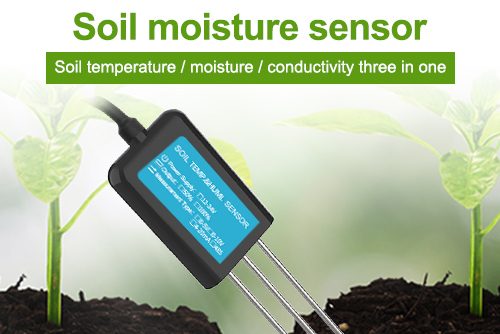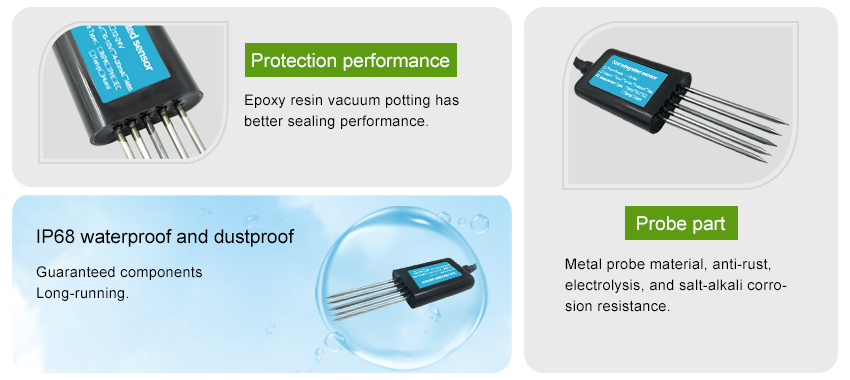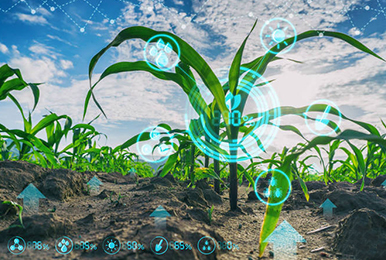Soil moisture is a critical factor in agricultural productivity and sustainability. The ability to accurately monitor soil moisture levels is essential for optimizing irrigation practices, preventing water wastage, and promoting sustainable agricultural practices. Soil humidity sensor have become as a crucial tool for monitoring soil moisture levels, enabling farmers to make informed decisions and improve crop yields. In this article, we will explore the significance of soil humidity sensors, their technical capabilities, applications, and the transformative impact they have on agricultural efficiency and sustainability.
Technical Capabilities of Soil Humidity Sensor

Soil humidity sensor are advanced devices for measuring soil moisture content. These sensors use various technologies such as capacitance, resistance, and time-domain reflectometry (TDR) to measure soil moisture levels accurately. Modern soil humidity sensors are equipped with advanced features such as wireless connectivity, data logging, and remote monitoring capabilities, enabling farmers to access real-time data on soil moisture levels.
Applications of Soil Humidity Sensor
The applications of soil humidity sensor are diverse and far-reaching, spanning across agricultural, environmental, and industrial domains. In agriculture, soil humidity sensors are utilized to optimize irrigation practices, enabling farmers to water crops only when necessary, reducing water wastage, and promoting sustainable water management practices. By providing real-time data on soil moisture levels, these sensors help farmers to avoid over-irrigation, which can lead to waterlogging, soil erosion, and crop damage.

Moreover, soil humidity sensors are monitor and manage soil salinity levels, which can have a significant impact on crop yields. By measuring soil moisture levels, farmers can adjust the salinity of irrigation water to prevent the accumulation of salts in the soil, which can impair plant growth and reduce crop productivity.
In environmental monitoring, soil humidity sensors are assess the impact of human activities on soil moisture levels, identify areas of soil erosion, and monitor the health of soil ecosystems. These sensors play a crucial role in early detection of soil degradation, enabling timely responses to mitigate environmental risks and promote soil conservation.
In the industrial sector, soil humidity sensors are used to monitor soil moisture levels in construction sites, ensuring the stability of foundations and preventing soil settlement. By providing real-time data on soil moisture levels, these sensors enable construction companies to take proactive measures to prevent soil-related accidents and reduce the environmental impact of construction activities.
Transformative Impact on Agricultural Efficiency and Sustainability

The widespread adoption of soil humidity sensors has revolutionized agricultural practices, promoting efficiency, sustainability, and resource optimization. These sensors provide farmers with real-time data on soil moisture levels, enabling them to make informed decisions on irrigation practices, fertilization, and crop management. By optimizing irrigation practices, farmers can reduce water wastage, conserve resources, and improve crop yields.
Moreover, soil humidity sensors support the implementation of precision agriculture techniques, enabling farmers to apply fertilizers and pesticides only where needed, reducing the environmental impact of agricultural activities. By providing accurate data on soil moisture levels, these sensors enable farmers to tailor their agricultural practices to the specific needs of their crops, promoting sustainable farming practices.
The integration of soil humidity sensors with other agricultural technologies, such as drones and GPS, enables the creation of interconnected agricultural systems. These systems facilitate the seamless sharing of data among stakeholders, including farmers, researchers, and policymakers, fostering collaboration and collective efforts to address agricultural challenges.
Conclusion
Soil moisture sensors are an indispensable tool for improving agricultural efficiency and sustainability. Plays a role in maintaining the integrity of soil ecosystems. With advanced capabilities, soil moisture sensors drive how we monitor, analyze and manage soil moisture. As technology continues to advance, soil moisture sensors will play an increasingly important role in promoting sustainable agricultural practices.
